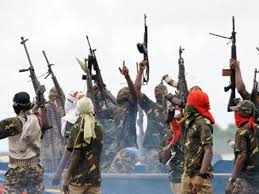If the Nigerian government wants to fight militants blowing up oil pipelines, it should send troops into the creeks and mangrove swamps of the Niger River delta. Not the city.
That’s the suggestion of Babalola Olarewaju, a taxi driver who plies the airport route in Port Harcourt, the largest city in the restive oil-rich region.
“We’re talking about people who blow up pipelines in the night and then disappear,” said Olarewaju, 41, as he perched on the hood of his rickety cab outside the Le Meridien Hotel in the city center, referring to three T-72 tanks, Nigeria’s main battle tank, parked about a mile away. “What has a tank got to do here in the city?”
A six-week-old cease-fire show signs of weakening: The Niger Delta Avengers, responsible for more than 90 percent of all attacks this year, on Sept. 23 claimed responsibility for an attack, its first since July 24, on a key supply pipeline to Royal Dutch Shell Plc’s Bonny export terminal, a few miles outside Port Harcourt, in a statement on its website. The authenticity of the website, which has proved reliable before, couldn’t be verified.
There’s a lot at stake. Exxon Mobil Corp. is planning to resume some shipments at its Qua Iboe terminal, the country’s largest, at the end of September and expects repairs on the 400,000 barrel-a-day main export line will be completed in December. Shell also expects its Forcados terminal, out since February, to come back on line any time now. The company earlier this month lifted a delivery halt on its Bonny terminal shipments it had imposed in August after saboteurs breached its main supply pipeline.
In all, output is now estimated to average about 1.5 million barrels a day “at best,” Kachikwu said on Aug. 12. That’s potentially 23 percent lower than last year.
The resurgence of armed conflict in the delta mirrors a 2006 to 2009 campaign by the Movement for the Emancipation of the Niger Delta, or MEND. Attempts by then-president Umaru Yar’Adua to quell the militancy using troops escalated the violence. Attacks were curbed only after a state pardon and monthly stipend was granted to fighters willing to disarm. Violence resurfaced after Buhari stopped the payments and ended pipeline security contracts worth millions of dollars that former President Goodluck Jonathan negotiated with the militants.
This has come to haunt the government. The militants today are more sophisticated and their attacks more precise. Led by the Niger Delta Avengers, the groups, now familiar with the layout of oil pipeline networks from their security operations, have in six months struck companies including Shell, Exxon Mobil, Chevron Corp. and Eni SpA where it hurt most: hard-to-fix export pipelines and oil-gathering hubs. So far this year, Forcados, Qua Iboe, Brass River and Bonny oil terminals have made declarations of force majeure — a legal term that allows companies to miss export commitments — after attacks on crude supply pipelines.
“A resumption of hostilities in the Niger delta would be disastrous for the government,” said Malte Liewerscheidt, senior Africa analyst at U.K. security consultants Verisk Maplecrost. “Sending the military is no solution.”
The conflict, combined with lower oil prices, has blighted the economy, sending it into a recession for the first time since 1991. Output contracted by 2.1 percent in the second quarter compared with 2.35 percent growth a year earlier. The oil industry shrank by 17.5 percent as production fell to 1.69 million barrels a day from 2.05 million barrels in the period. Nigeria depends on oil receipts for two-thirds of government revenue and more than 90 percent of foreign-currency income.
Brent, the benchmark for half the world’s crude trading, has lost about 45 percent in the past two years. Prices were down 0.3 percent at $50.75 a barrel as of 12:43 p.m. Singapore time on Tuesday.
Buhari, a former military ruler who came into office on an anti-corruption platform, pledged to boost security across Africa’s second-largest economy and most populous nation. He’s vowed to “deal” with the militants “as we dealt with Boko Haram,” a reference to a military offensive against a seven-year Islamist insurgency in the country’s northeast.
Security operations in the delta “are aimed at getting rid of all forms of criminal activities” in the region, according to army spokesman Sani Kukasheka Usman.
Shell will continue to monitor the security situation and take all necessary precautions, said Precious Okolobo, a Lagos-based spokesman. “The safety of our staff and contractors in Nigeria remains our highest priority.” Ogechukwu Udeagha, an Exxon Mobil spokesman, said “all inquiries on security be referred to government security agencies.” Chevron Corp., Total SA and Eni SpA didn’t immediately respond to inquiries seeking comments.
With troops already thinly stretched fighting the Boko Haram insurgency in the northeast and violent clashes between nomadic herders and farmers across the country’s central region in recent months, the government risks dragging the army into another protracted campaign, said Pabina Yinkere, energy analyst and head of research at Lagos-based Vetiva Capital Management Ltd., as the militants are on home turf with better knowledge of the delta terrain.
Nigeria military spokesman Brigadier-General Rabe Abubakar didn’t respond to calls and text message.
“The government needs to come up with a concrete plan to develop the Niger delta and create economic opportunities for the people,” Yinkere said. “The security situation is still fluid and if the government does not approach this tactfully, it risks further escalating the tension.”
Source: Business Day














